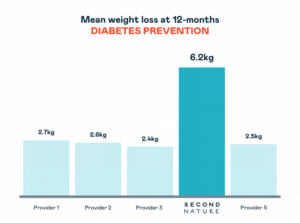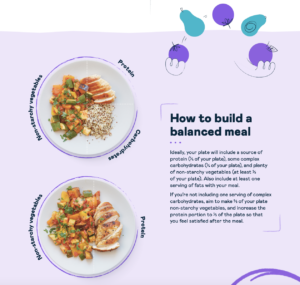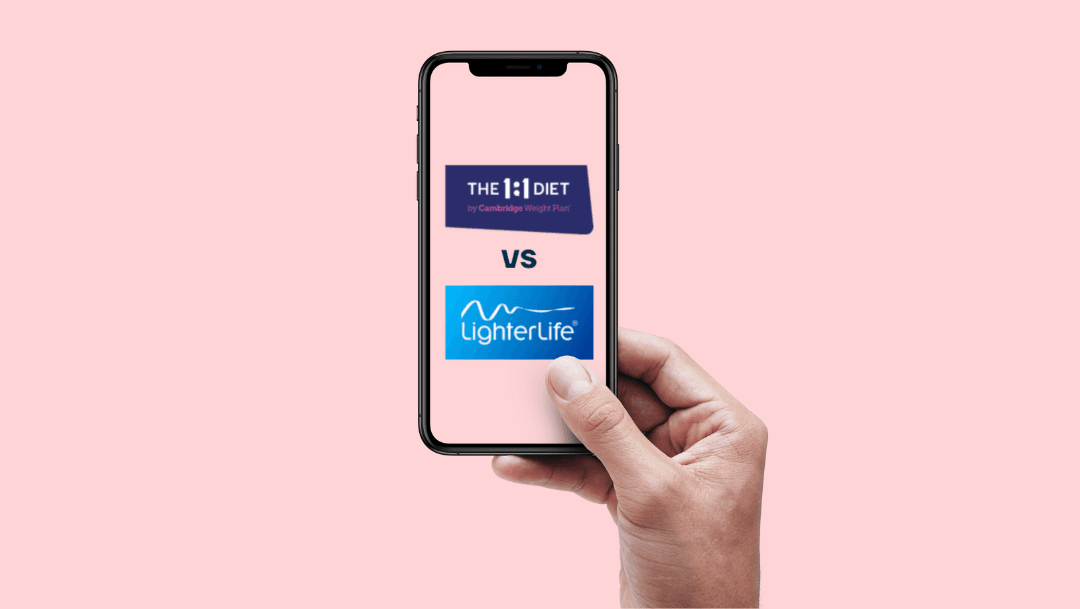Weight loss programmes can provide a helpful structure for your health journey when you feel out of control with unhealthy habits and are living with obesity.
They can also be a great way to join individuals going on the same journey, which can be incredibly motivating.
Everyone is different, and there is no one-size-fits-all approach to choosing a weight loss programme.
It ultimately depends on what suits your individual needs and what fits into your lifestyle. Some people want rigid rules and a quick fix, whereas others like more flexibility and a long-term lifestyle change.
Many people find online weight loss programmes more convenient and easier to fit into daily life.
To save you tiresome research and help to answer some crucial questions, this guide compares three popular online weight loss programmes; The 1:1 Diet by Cambridge Weight Plan, LighterLife, and Second Nature.
The Cambridge Diet might sound more familiar to you, and it was initially designed by Dr Alan Howard of Cambridge University in the 1960s.
Both The 1:1 Diet by the Cambridge Weight Plan and LighterLife are very low-calorie diets (VLCD) using meal replacements and diet products to achieve results. We would recommend consulting a doctor before starting these programmes.
Do very low-calorie diets work?
To lose weight, you need to be in a calorie deficit, so your body burns through excess fat stores. So any approach that puts you in a calorie deficit will help you lose weight in the short term.
The VLCD approach used in the Cambridge diet plan and LighterLife will help you lose weight, and you’ll likely experience rapid weight loss if you stick with the protocol.
The approach will likely result in you being in a state of ‘ketosis’. This is where your body starts to burn a lot of fat, and the liver breaks down extra fat to produce ketones which can be used for fuel in the brain.
Side effects of VLCDs can be lethargy, bad breath, brain fog, and hunger.
However, these crash diets often fall down for a few reasons:
- They don’t empower you to lead a healthier lifestyle after you’ve lost weight.
- You might struggle to adhere to the strict regime as your body goes into a starvation response, and you start to feel hungry and deprived.
- You don’t learn how to maintain your weight after you’ve lost it.
So, if you’re confident you know what to do after you’ve lost weight, and you’re happy to live on meal replacement products for your sole source of calories to achieve your weight loss goals, then a VLCD could be a good fit for you.
But if you’re concerned about sustainability, don’t like the idea of meal replacement diets, and are keen to live a healthier lifestyle, Second Nature might be more appropriate.
The Second Nature approach: sustainable and effective
In 2022, the NHS published data in the British Medical Journal from the National Weight Management and Diabetes Prevention programme, where five providers delivered weight loss services in the UK.
The results showed that after 12 months, Second Nature was more than twice as effective as the four other providers. Currently, neither Cambridge Weight Plan nor LighterLife have published long-term data in an accredited journal.

How does Second Nature’s approach work?
We approach nutrition and healthy eating differently. We don’t count calories, track macros, weigh food, or ask you to go on a strict crash diet to lose weight fast.
We provide you with evidence-based guidance on a balanced diet and teach you to understand what your physical and emotional drivers for eating are to reach your weight loss goals.

We also provide tools, such as our hunger scale and mindful eating techniques, that help you tune into your physical hunger cues and manage your food choices.
Alongside this, we help you build healthy habits that you can enjoy for a lifetime to help you maintain a healthy weight.
Our feedback inbox is filled with people like Jo, who lost over eight stone to achieve a healthy body weight on Second Nature after following our nutrition guidelines and receiving the support of our app and health coaches.
The difference is that members of Second Nature learn to love food again. They’re no longer restricted. They’re liberated.
If you’d like to join over 150,000 others who’ve joined Second Nature, lost weight and kept it off, then click here to take our health quiz.
Otherwise, keep reading as we look at other key differences and similarities between Second Nature and the Noom programme.
Trustpilot score
Trustpilot is a platform where consumers can leave reviews, and scores reflect overall customer satisfaction.
| The 1:1 Diet by Cambridge Weight Plan | LighterLife | Second Nature | |
| Star rating |  |
 |
 |
| Score | 3.5 / 5 read reviews |
3.9 / 5 read reviews* |
4.8 / 5 read reviews |
Signing up
| The 1:1 Diet by Cambridge Weight Plan | LighterLife | Second Nature | |
| Money back guarentee | Diet consultants can provide you with a full refund of any unused Cambridge diet products within 14 days of purchase, providing the products are in a resalable condition. | ✗ | Full refund if cancelled within 14 days. After this point, any charges non-refundable. |
| Clear breakdown of costs | ✗ (Prices vary per consultant) |
✗ (Prices vary per consultant) |
✓ |
| Clear cancellation policy | ✗ | ✓ | ✓ |
| Length of programme | Varies per “step” and per consultant | Foundation: 14 weeks Development (optional): ongoing |
Ongoing subscription |
| Easy to cancel | ✓ | ✓ | ✓ |
| Refer-a-friend scheme | ✗ | ✗ | ✓ |
| Easy to include family | ✗ | ✗ | ✓ |
Nutrition
The 1:1 Diet by Cambridge Weight Plan and LighterLife are considered extreme weight loss plans. It’s essential that before start on a very-low-calorie diet (VLCD), you consult your doctor.
| The 1:1 Diet by Cambridge Weight Plan | LighterLife | Second Nature | |
| Dietary approach | Very low-calorie diet (VLCD), uses meal replacements | Very-low-calorie diet (VLCD), uses meal replacements | Whole foods, lower carb* |
| Caters to vegetarian | ✓ | ✓ | ✓ |
| Caters to vegan | ✗ | ✓ | ✓ |
*For examples of recipes on the Second Nature, see here
Support
| The 1:1 Diet by Cambridge Weight Plan | LighterLife | Second Nature | |
| Tailors the plan around diabetes | ✓ | ✗ | ✓ |
| Tailors the plan around other health issues | ✓ | ✗ | ✓ |
| Private chat with a registered dietitian or nutritionist | ✗ | ✗ | ✓ |
| Weekend support available | ✓ (Dependant on the consultant) |
✓ (Dependant on the consultant) |
✓ |
| Phone support available | ✓ (Dependant on the consultant) |
✓ (Dependant on the consultant) |
✓ |
| Face-to-face meetings | ✓ (Dependant on the consultant, offered priod to COVID-19 restrictions) |
✓ (Dependant on the consultant, offered priod to COVID-19 restrictions) |
✗ |
| Developed by dietitians, nutritionists, and health psychologists | ✗ | ✗ | ✓ |
Programme features
| The 1:1 Diet by Cambridge Weight Plan | LighterLife | Second Nature | |
| App | ✗ | ✗ | ✓ |
| Recipe videos | ✗ | ✗ | ✓ |
| Exercise videos | ✗ | ✗ | ✓ |
| Weighing scales provided | ✗ | ✗ | ✓ (on tech plan) |
| Encourages weekly weigh-ins | ✗ | ✗ | ✗ |
| Makes you take numerous body measurements | ✗ | ✓ | ✗ |
| Tracks sleep | ✗ | ✗ | ✓ |
| Tracks steps | ✗ | ✗ | ✓ |
| Tracks exercise | ✗ | ✗ | ✓ |
| Tracks water intake | ✗ | ✗ | ✓ |
| Education of nutrition science | ✗ | ✗ | ✓ |
| Requires calorie counting | ✓ | ✓ | ✗ |
| In-app journalling | ✗ | ✗ | ✓ |
Pricing
When programmes provide price plans in different formats, it can be hard to compare prices accurately.
To make this easier, we have calculated the price of monthly basic price plans on each programme to show you how costs compare (as of January 2021).
The 1:1 Diet by Cambridge Weight Plan pricing is estimated based on three replacement meals a day and LighterLife is based on four food packs a day and no conventional food.
It’s best to discuss pricing based on your needs before starting the programme, as this may vary.
All programmes provide access to a coach to support and encourage you throughout the programme.
A key difference between the programmes is that Second Nature’s coaches are registered nutritionists or dietitians rather than previous members (The 1:1 Diet by Cambridge Weight Plan and LighterLife).
Only Second Nature includes access to a private chat with a registered dietitian or nutritionist who will be with you every step of the journey.
Registration to a professional body requires a nationally recognised nutrition or dietetics degree.
Weekly face-to-face sessions with a registered dietitian or nutritionist can be very expensive (£40-£100/hour). We have added a column representing this to compare costs (Weekly Nutritionist – WN).
Monthly (basic) digital subscriptions:
| The 1:1 Diet by Cambridge Diet | LighterLife | Second Nature | WN | |
| Registered dietitian or nutritionist coach | ✗ | ✗ (Coaches have qualifications but don’t have to be registered*) |
✓ | ✓ |
| The same, personal coach throughout the programme | ✗ | ✗ | ✓ | ✓ |
| Price | £221/month* | £278/month** | £28/month for annual subscription. | £300/month |
*Pricing for The 1:1 Diet by Cambridge Weight Plan based on £55.23 per week (£2.63 per meal). This is based on three meals a day and a weekly one-to-one consultation. Price varies across consultants and options selected.
**Pricing for the LighterLife Plan is based on the 8-Week VLCD Food Package Subscription Bundle, priced at £69.99 a week. Price varies across options; the full range of products is available here.
Example nutrition query response
Nutrition is a significant part of any weight loss journey. Therefore, it is essential to receive accurate and reliable nutrition advice.
We asked each programme a common nutrition-related query to see how the information provided as an answer compares.
Q: Are eggs bad for your cholesterol? Should I avoid them?
The 1:1 Diet by Cambridge Weight Plan’s answer:
““We at head office are not trained as dieticians and cannot give out specific information on the benefit of eggs for your diet, but if you do have concerns about your cholesterol we would advise you to seek a medical opinion concerning your whole diet and the food groups you should look at avoiding.”
LighterLife’s Answer:
“That isn’t something we can advise you on I’m afraid. On our Total plan you would have 4 Foodpacks a day and no conventional food.
We do have a structured Management plan for food reintroduction so we advise what foods to introduce, when to introduce them and the quantities.
For information on cholesterol you can look online. I’m sure there is lots of information out there for your specific question.”
Second Nature’s answer:
“Eggs are a rich source of dietary cholesterol. It was previously thought that cholesterol-containing foods increase blood cholesterol and the risk of heart disease and strokes.
However, this is not the case as dietary cholesterol is poorly absorbed from the digestive system.
If cholesterol is absorbed, the body will produce less of it to balance out (and prevent blood cholesterol levels rising).
Therefore, you do not need to be restricted unless recommended to do so by your GP/Healthcare professional.
Eggs are among the most nutritious foods on the planet, providing good quality protein and being loaded with vitamins and minerals.”
Take home message
- When choosing a weight loss programme, it’s important to consider what would fit into your lifestyle and help you achieve your goals.
- Online programmes are a better option for those who find face-to-face weight loss meetings uncomfortable or inconvenient.
- The 1:1 Diet by Cambridge Weight Plan and LighterLife programmes are delivered online, given the current restrictions, whereas Second Nature has always been delivered digitally.
- Second Nature provides a registered dietitian or nutritionist personal health coach, whereas consultants for The 1:1 Diet by Cambridge Weight Plan and LighterLife are individuals who’ve had success on the programme
- The 1:1 Diet by Cambridge Weight Plan and LighterLife use meal replacements, whereas Second Nature provides you with an education in nutrition science, allowing you to make informed decisions yourself and develop a healthy relationship with food in the long term.
- Customer support is available on all programmes.


